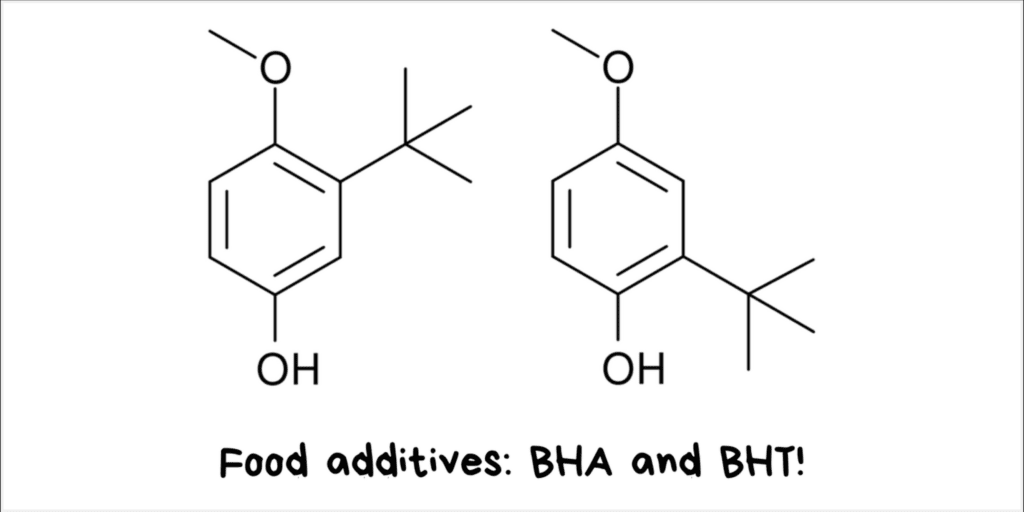The effects of food additives BHA (Butylated Hydroxyanisole) and BHT (Butylated Hydroxytoluene) are addressed carefully in this article. Food additives are components that are added to food to preserve flavour or improve appearance, taste, or other sensory qualities. Some additives, such as salt (salting), sugar (crystallisation), smoke (smoking), vinegar (pickling), and others, have been used for centuries to preserve food. This allows for preserving foods such as desserts, bacon, and wines.
As processed foods became more popular in the second half of the 20th century, many natural and artificial ingredients were added to them. “Indirect additives” are substances that can be added to the food while it is being packaged, made, stored, or shipped.
Over time, many different food additives have been made to meet the needs of food production, which is very different when done on a large scale than when done at home. Additives are needed to ensure that processed food stays safe and in good shape as it moves from factories or industrial kitchens to warehouses, stores, and finally to consumers.
BHA (Butylated Hydroxyanisole)
BHA is mainly employed as a preservative and antioxidant in food, food packaging, cosmetics, animal feed, rubber, and petroleum products. The stability of a product is one of the most critical procedures in the formulation process. Selecting a product’s stability helps ensure that it is safe to use and will not spoil soon. When antioxidants are used as a method of preservation, the requirement for additional types of preservation is decreased, resulting in a more stable formulation. Antioxidants, like butylated hydroxyanisole, are essential to the quality and durability of cosmetic and skincare products.
BHA is found in many foods and drinks, such as beer, meats, butter, baked goods, cereals, snack foods, chewing gum, and dehydrated potatoes.
There are several harmful things included in the effects of food additives. Some evidence claims that high doses of BHT may mimic oestrogen, the primary female sex hormone, and decrease the expression of male sex hormones, potentially harming fertility.
BHT (Butylated Hydroxytoluene)
Butylated hydroxytoluene, abbreviated BHT, is a chemical produced by humans and used as a preservative in both food and cosmetic items. This chemical is widely used in these foods to keep the colour, fats, and texture, as well as the oils, intact. Furthermore, it is a synthetic antioxidant that is added to processed foods. The dangers of BHT include the likelihood of cancer and hormone imbalance. Some people argue that BHT is toxic and should be avoided.
The effects of food additives are several in number. High doses of BHT given over a long period to mice and rats are toxic and cause several health problems, including problems with the liver, kidneys, lungs, thyroid, and blood clots. Under certain circumstances, BHT can help a tumour grow.
The following are some of the goods that include BHT: Flavoured products, Chewing gum, Snack foods, Baked goods, Dehydrated foods, Foods like preserved chips and meats, Breakfast cereals, Lotions, and Lip glosses.
Tips to stay away from food additives
By leading a healthy lifestyle and eating proper food, one can reduce or eliminate the adverse effects of food additives. If you want to avoid butylated hydroxyanisole – BHA, it is essential to read the labels on food and cosmetics goods.
One strategy to reduce your risk of BHT exposure is to avoid goods that list BHT or butylated hydroxytoluene on the label.
BHT is known by several names, including 2,6-Di-tert-butyl-p-cresol, Butylhydroxytoluene, 128-37-0, 2,6-Di-tert-butyl-4-methylphenol, Butylated hydroxytoluene, and BHT.
Some healthier alternatives to BHT include:
- To keep the food fresh, rosemary extract can be employed.
- Vitamin E aids in the preservation of the original freshness of the items.
- Perishable foods should be stored in BHT-free containers.
- Incorporate vitamin C-rich lemon juice into your recipes.
- Everything that will not be consumed soon should be frozen.
Follow the steps below to avoid food additives. Whenever possible, it is best to buy and serve fresh, organic fruits and vegetables. Processed meats, like ham, hot dogs, and meats in pre-packaged meals, should be avoided, especially during pregnancy. Avoid using plastic wherever possible while handling or storing hot food by switching to glass or stainless-steel containers.



